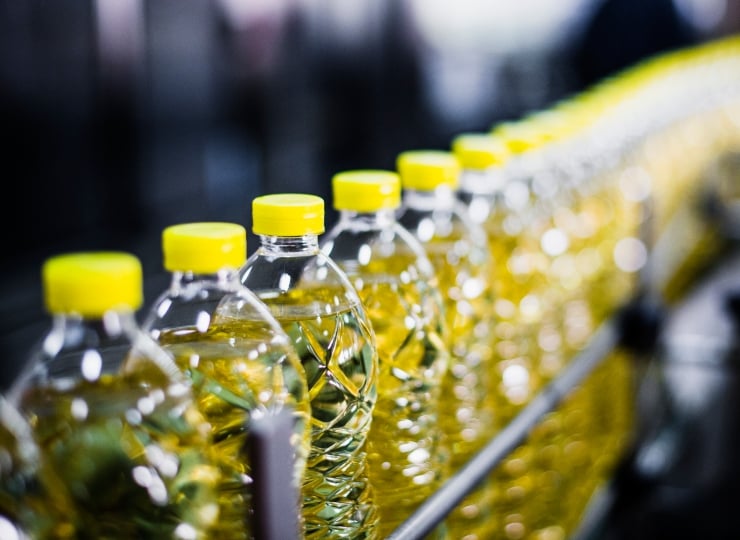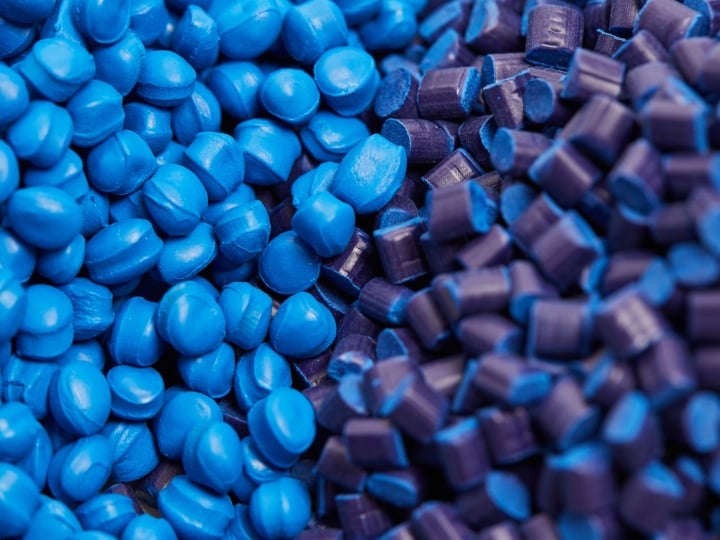Comprehensive testing of plastic films for quality and performance across various applications, including recycled materials, using factors like gel count and defects and a range of mechanical and physical property tests
Plastic film testing enables the evaluation of films that play a crucial role in various industries, from food packaging to construction, transport and medical applications. Ensuring the quality and performance of these films is essential to maintain safety, durability, and efficiency in their intended application. Intertek specialises in end-to-end plastic film testing services to evaluate mechanical properties, barrier performance, and overall durability. With a portfolio of lab services supporting the packaging film development, we are one source solution beginning at compounding, extrusion and testing support film development from polyethylene (LDPE, HDPE) or polypropylene (PP) and recycled materials produced as single-layer or multi-layer constructs.
Packaging Film Compounding and Extrusion
Intertek's polymer experts conduct compounding trials using single-screw and double-screw methods to optimise materials with existing or novel additives, including carbon fibres and flame retardants. These tests are particularly relevant to the automotive industries, where there is increasing focus on the circularity of materials. Additionally, our lab-scale extrusion capabilities help produce plastic packaging films from a wide range of materials. This allows for online gel count/defects and thickness measurement to facilitate material evaluation. With filter choking, we test the throughput of the film materials during processing and determine the trapped gels, particles or other contamination from the process or material, giving insight into the processability and quality of the materials.
Testing Flexible Packaging Film from Recycled Materials
Testing films made from recycled materials involves comprehensive evaluation for quality, focusing on key factors such as gel count and defects. Our CircularAssure team use advanced laboratory methods, including chemical safety testing and processability assessments, to ensure that these plastic packaging films meet performance standards compared to virgin materials. Our programmes can use gelcount as a quick quality control for post-consumer recycled materials for materials from injection molding appliances. With thorough mechanical and physical product testing, we help ensure the quality and safety of recycled film products in various applications. We can also perform migration testing and NIAS studies where the films are intended for a food contact application.
Mechanical and Physical Property Testing of Plastics Films
Tensile Strength and Elongation:
One of the fundamental tests for plastic films is the tensile test, assessing how much force a film can withstand before breaking. We conduct tests according to international standards such as ISO 527-3 or ASTM D882, providing precise data on strength and elasticity.
Creep Testing
We study the creep of the film in a heated oven to explore the using an in house method.
Puncture Resistance:
To evaluate a film's ability to resist punctures, we use methods like ASTM F1306 slow rate penetration, ASTM D1709 Standard Test Methods for Impact Resistance of Plastic Film by the Free-Falling Dart Method, ASTM D5748 Protrusion puncture test for stretch wrap film and ISO 7765-2 impact resistance by free falling dart and ASTM F1306 crucial for applications where films encounter sharp objects or high impact environments.
Friction Testing:
Friction testing for plastic films involves assessing their tendency to adhere to each other under specified conditions. ISO 11502 outlines two methods: one qualitative and one quantitative, to measure blocking resistance. The Parallel Plate Method (ASTM 3354), a quantitative test, evaluates the blocking load between layers of plastic film. ISO 8295 specifies methods for determining the coefficients of starting and sliding friction of plastic film when sliding over itself or other surfaces. Additionally, the Peel Cling test (ASTM D5458) measures cling between layers of stretch wrap film in stretched and unstretched conditions.
Elastic Recovery:
We use ASTM D5459 as a test method for measuring the elastic recovery, permanent deformation, and stress retention of stretch wrap film in the machine direction. It evaluates how well the film recovers after being stretched and its ability to retain applied stress over time.
Tear Resistance:
The tear resistance of films, crucial for their durability, is assessed through methods such as the Elmendorf test (EN-ISO 6383 part 2), ASTM D1922 or the graves tear test (ASTM D1004) to measure the force required to propagate a tear through the material.
Impact Resistance:
Testing methods like ASTM D1709 Standard Test Methods for Impact Resistance of Plastic Film by the Free-Falling Dart Method are employed to determine how well films withstand impact from falling objects, ensuring they maintain integrity under stress.
Film Dimension Testing
Sometimes shrinkage is desired, for instance at shrink film for wrapping, sometimes it is not desired. Shrinkage can be tested with ISO 11501, Plastics — Film and sheeting — Determination of dimensional change on heating, it testing the shrinkage in a heated kaolin surrounding. The shrinkgage can also be tested in oil according to an in house method.
The shrinkage tension can be determined by putting the film in an oven while linked to a loadcell to determine the tension when shrunk.
Barrier Properties Testing, Oxygen and Water Vapor Transmission Rates:
Understanding how well films protect against oxygen and water vapor transmission is vital for applications where maintaining product freshness and shelf life are critical. Our barrier property testing capabilities include ASTM D3985, ASTM F1249, and their respective ISO standards.
Seal and Package Integrity Testing
Seal Strength:
The strength of seals in packaging is crucial to prevent leakage and ensure product safety. Tests such as ASTM F88 evaluate the peel strength of seals, while ASTM F1921 assesses hot tack strength, crucial for packaging efficiency.
Hot Tack Testing:
Intertek evaluates product seal strengths by performing hot tack testing according to ASTM F1921 (method B). Hot tack measures the strength of heat seals formed between thermoplastic surfaces of flexible webs, immediately after the seal has been made and before it cools to room temperature. This heat seal property is important since this situation occurs on vertical form-fill-seal packaging.
In the heat sealing process, contents are dropped into the bag immediately after the horizontal seal bars have opened. Since the content can be heavy, the hot seal must be able to withstand high loads, thus requiring a high hot tack force. This measurement will be of influence while upgrading packaging materials or packing production processes.
Package Integrity:
Methods like ASTM F1140, Standard Test Methods for Internal Pressurization Failure Resistance of Unrestrained Packages, evaluate package burst and creep resistance, ensuring that packages can withstand internal pressures during handling and transportation.
Optical Property Evaluation
Gloss and Haze:
Optical properties such as gloss (ASTM D2457) and haze (ASTM D1003) are evaluated to maintain consistent appearance and quality in films used for various applications. For clarity we use the BYK method and we also measure colour in terms of L*a*b* colour space using Colorimetry as per Part 4: CIE 1976 L*a*b* colour space (ISO/CIE 11664). We are also able to measure yellowness and whiteness.
Your Partner for Film testing
At Intertek, we understand that different industries have unique requirements. Our testing services are tailored to meet specific needs, whether for food packaging, medical applications, or industrial uses. We provide comprehensive reports and data analysis to help manufacturers optimize their film materials for maximum performance and compliance with industry standards.
Our commitment to quality and innovation drives us to continually invest in state-of-the-art testing equipment. This ensures that our clients receive accurate and reliable test results promptly, enabling them to make informed decisions about their product development and quality assurance processes.
For more information on how our plastic film testing services can benefit your organization, contact us today. We are dedicated to supporting your success by delivering exceptional testing services that meet the highest industry standards.
Durability
Assess the ability of film and packaging materials to withstand wear, pressure and damage.
- Impact Resistance (ASTM D7192, ISO 7765, ASTM D1709)
- Flexible Durability - Gelbo (ASTM F392)
- Puncture Resistance (ASTM F1306)
- Tear (ASTM D1922, ISO 6383, ASTM D1938, ASTM D1004)
- Tensile (ASTM D882, ISO 527)
- Bond Strength (ASTM F904)
- Peel (ASTM D3330)
Barrier Testing
Better understand adsorption, dissolution, diffusion, and desorption of materials to maximize preservation effect and prolong storage periods of your products
- Oxygen Transmission Rate, OTR (ASTM D3985, ISO 15105-2)
- Water Vapor Transmission Rate, WVTR (ASTM F1249, ISO 15106-2)
- Water Vapor Transmission - cup method (ASTM E96)
Package Integrity & Seal Strength
Evaluate the optimum combination between seal time and seal quality in relation to production time of packages.
Package Integrity
- Seal Integrity (ASTM F1929)
- Package Burst/Creep (ASTM F1140)
Seal Strength
- Seal Strength - Peel (ASTM F88)
- Restrained Burst - Hot Tack (ASTM F1921, ASTM F2029)
Visibility & Appearance
Optical property evaluations at Intertek evaluate product consistency.
- Haze (ASTM D1003)
- Gloss (ASTM D2457)






